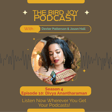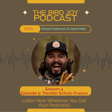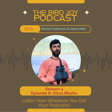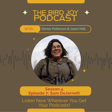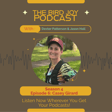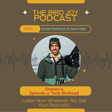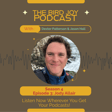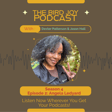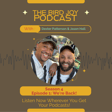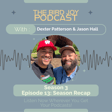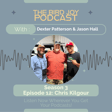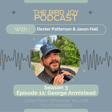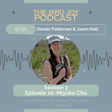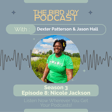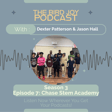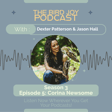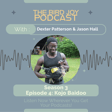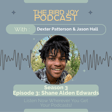Become a Creator today!Start creating today - Share your story with the world!
Start for free
00:00:00
00:00:01

Nature, Healing, and Representation with Dudley Edmondson
In this inspiring episode of the Bird Joy Podcast, hosts Dexter and Jason sit down with renowned photographer, author, filmmaker, and speaker Dudley Edmondson. With a career spanning over 30 years, Dudley has captured nature's wild beauty and redefined who belongs in those wild spaces. From the Arctic Circle to inner-city green spaces, Dudley's work weaves together storytelling, healing, and representation in the outdoors.
He shares insights from his groundbreaking book Black & Brown Faces in America's Wild Places and his latest project, People the Planet Needs Now, which features 25 BIPOC scientists and activists shaping the future of climate justice. Tune in for a moving conversation on legacy, leadership, and the joy of birds and wild places.
Resources & Mentions:
- 📚 Black & Brown Faces in America's Wild Places by Dudley Edmondson
- 📖 People the Planet Needs Now
- 🎥 PBS: America Outdoors with Baratunde Thurston
- 🖼️ Minnesota Marine Art Museum – Northern Waters
Connect with Dudley Edmondson:
- Website: www.dudleyedmondson.com
- Instagram: @dudleyedmondson
BIPOC Birding Club of Wisconsin: bipocbirdingclub.org
In Color Birding Club: incolorbirding.org
Transcript
Introduction to Season 3 and Hosts
00:00:00
Speaker
You're tuned in to season three of the Bird Joy podcast hosted by Dexter Patterson and Jason Hall. This podcast is for all the homies across the globe, a place to celebrate birds, community, and joy together.
00:00:15
Speaker
We're back with more stories from the birding world, more voices doing dope work in STEM, and more reasons to get outside and enjoy the birds. Are you ready for some bird joy?
00:00:27
Speaker
Let's go.
Guest Introduction: Dudley Edmondson
00:00:28
Speaker
Today's guest is somebody whose work and wisdom have shaped the way that we see nature, not only as a destination, but as a powerful tool for healing, connection, and representation. We're honored. to be joined by Dudley Edmondson, a photographer, author, filmmaker, and speaker whose career spans over 30 years. Dudley's images and stories have taken him from the Arctic Circle to the Bahamas, always returning to the idea that nature belongs to all of us. As one of the first to highlight African-American involvement in the outdoors, Dudley's landmark book, Black and Brown Faces in America's Wild Places, helped pave the way for future generations of diverse outdoor leaders.
Connecting Urban Youth to Nature
00:01:10
Speaker
He's worked tirelessly to connect urban youth and youth of color to green spaces, and his newest work, People the Planet Needs Now, continues that legacy by amplifying the voices of 25 BIPOC scientists and climate activists. Let's dig into some healing, some storytelling, representation, and why birds and wild places matter more now than ever. Dudley, welcome. Welcome to the Bird Joy podcast. Hey, brothers. It's it's nice to be here. Thank you for that amazing introduction. I really appreciate it. Very nice. Very nice.
00:01:43
Speaker
We appreciate you. You know, I feel like the introduction only kind of does the justice for somebody of your stature and what you've meant to us and what you've meant to the world for black and brown folks and outdoors. Jason, we were talking about before we actually started recording, you were at the top of our list when we started thinking about all of these different people that that we need to interview for this podcast, because I don't know, man, just the inspiration. We look at you like the OG, you know, I appreciate it. I mean, I've been, I've been, yeah, I've been out here for a while. I mean, I've been, you know, I've been watching birds for like 45 years, which is sounds like, really? I think to myself and it's like, yeah, that's, that's as long as you've been at. mean, math is mathin'. Yeah, exactly. I mean,
00:02:31
Speaker
When I first started, i knew two, I think maybe two other people of color who were who were bird watchers. And i really never thought that come a day when like Black folks watching birds is like Black folks doing all kinds of things that we do. just part of kind of a regular thing that we do these days. and so i It just just still shocks me when I, you know, I look on Instagram and I see, you know, groups of black folks dancing with binoculars and stuff. going like, what?
00:03:02
Speaker
It's like, okay, all right, all right. It's good. It's good. We got to do it the way that we need to do it. That's really the key part of that. And, you know, and joy is the key word, which is why we're here on this podcast. And, you know, you've had said 45 years of watching birds, right? And so I assume that extended into your childhood. And then, you know, this 30 plus years of of, you know, kind of professionally taking pictures and writing and speaking and like what kind of started you on that path, whether it was photography or the outdoors, like what, what was the genesis of, of
00:03:37
Speaker
who
Dudley's Bird Watching Journey
00:03:38
Speaker
you are now. I got into birds actually in junior high school back in the 70s. I did a book report on birds of prey, and I really got into like monkey eating and Philippine eagles and Marshall eagles, lamb of tires. mean, it's like, I'm just a raptor nut anyway. Mm-hmm. Raptors and warblers are my favorite two things to photograph and watch.
00:03:59
Speaker
Like I said, seventh, eighth grade, I got in i got into raptors, birds prey and stuff, and it just kind of carried on. And then when I was in high school, my art teacher in my senior year, Mr. Gamble, Charles Gamble, he he was a birder, and he had these mad skills that that I was like,
00:04:16
Speaker
How do you do that? You know, we were driving down a freeway. We raised a bunch of money in high school to go to Texas, to Aransas, to see whooping cranes back in 1970, 1980. We're driving.
00:04:32
Speaker
Some of us aren't old enough to be driving, but we're driving, you know. It's a different time. driving down the highway in Texas. you know He's driving along and go, Creston Carrot Carrot. And I'm like, what?
00:04:48
Speaker
How'd you, what? I mean, we're going 75 miles. How did you identify that thing? It was top of a tree, quarter mile, half a mile away. And I said, man, I gotta get them skills. I gotta get those skills.
00:04:58
Speaker
And, cause it just, it was, they just amazed me. and so now I can do the same thing, you know just hear tiny bit of a bird or get a little glimpse and Something I've discovered is that your brain kind of has a Rolodex of sounds and images that over four plus decades for me, i mean, I've probably seen close to a million individual birds when I think about birds.
00:05:27
Speaker
You know, all the the snow geese and sandhill cranes and countless you know encounters with birds in my yard and in my travels. And so you build up this yeah muscle memory to.
00:05:43
Speaker
And so it's like, it feels like to me what happens is you hear a sound, then your brain goes through and finds a match. Boom. And goes Common Yellow Throat, Clay Coder Sparrow, Eastern King Bird. It's almost like a, I don't know, like a one-armed bandit. It's like you get the sound and then on this side, boom. And then they match. And when they match, words come out of your mouth.
00:06:08
Speaker
Yeah. And that's kind of what I find that's what happens with my brain these days is I'm just referencing all of the sound and visuals that I've accumulated and then matching them with what's going on right in front of me. And then I and then i can identify stuff. if That's the best way to explain it for me as to how my brain works with birds.
00:06:29
Speaker
Yeah. And I like to try to tell birds. First birders, people that are getting into bird watching, if you're having trouble with songs and sounds, old school way I did was CDs.
00:06:41
Speaker
I used CDs and I would listen to a CD in my car on my way to go birding. And so I'm listening, Connecticut Warbler. And then they play the song. It might be hard to find those. But if you can find Stokes, Peterson.
00:06:55
Speaker
They're still out there. yeah the player The player might be harder for people. yeah but you can get them online, too, and listen to them. So that's pretty sweet. that That's what I recommend. but But I'm talking too much. Go ahead. No, no. That's that's what we love.
00:07:11
Speaker
That's what we love um is bringing on our guests to educate and uplift our audience and share their experience and their knowledge. And we haven't had somebody with your experience. I say you and and Drew Lanham are probably the most experienced, but it's a Christian, too. christian You three are the ones that have been on this podcast with the most experience. So we really appreciate it. um You talk a lot about nature's ability to heal. What was a moment, you know, similar to you wanting to get this knowledge, but what was this moment that you realized that that nature had this ability to heal you? What what made that message personal for you?
00:07:49
Speaker
You know, I mean... As a kid, i lived in a household with folks. but My parents had issues with alcohol.
00:08:00
Speaker
And found that when I was outdoors, lot of times we'd go on weekends, we'd go on family picnics to a place called Hoover Reservoir. And then when I would go, know, we'd go to these places. I mean, I'm playing in the woods near our picnic area, or I'm fishing, me and my dad and my brother are fishing for Channel Cats. My sister and mom are on the grill listening to, you know, B.B. King and Bobby Blue Bland and James Brown.
00:08:30
Speaker
You know, and and that was that was life outside the house. I just it was really therapeutic to be in that space and just no drama. You just enjoying yourself, looking at birds and the leaves and and all kinds of stuff.
00:08:46
Speaker
And so just healed my mind. But then when i would. get back home, you know, we get back home, you know, you get back into that, that, that, that situation, you know, where, where they start bickering and maybe turning the bottle a little bit and, next thing you know, chaos everywhere. And so,
00:09:07
Speaker
What I would do is is I had aquariums and plants and and terrariums and things in my bedroom. And so when things got hot, I would just go in the room, close the door, and play with my crappies.
00:09:24
Speaker
or I had piranhas. I had praying mantises. you know I had all kinds of stuff and plants. And so I would just lose myself in nature in my bedroom if I couldn't get out of the house on something else. I discovered that fairly young.
00:09:40
Speaker
At 63, I'm still using nature to heal. It just is part of who I am. And I don't think I'll ever reach a point in my life where nature won't have great value to me.
00:09:53
Speaker
It just is. I mean, it's how I get through stuff. yeah And I recommend, again, recommend it to other people. It's a good way
Cultural Heritage and Musical Influences
00:10:01
Speaker
to get through stressful stuff. Hey, Dudley, I got I got something for you, man. You recognize this, dude?
00:10:07
Speaker
Bobby Blue Band. Bobby Blue Band. So that this is the blues you can use. yeah just just I just picked this up yesterday. Really? From the homies at Dripping Culture Coffee in Waukegan.
00:10:25
Speaker
I also got Johnny Taylor. Johnny Taylor. He's that jerk, girl. Yeah.
00:10:32
Speaker
this is the lover boy record yeah yeah yeah and then i had to get the homie lou ross too uh so i picked up that was yeah that was yesterday man so when you said when you said bobby i said hold on i gotta show that i picked up some bobby bland yesterday yeah I mean, and and that, that would you know, that's the age, you know, growing up in the seventy s That's what you were listening to, you know, all that kind of stuff, you know, mixture of that. And as I got older, you know, used doing part of my Funkadelic and Cameo and and ah and then I then I.
00:11:10
Speaker
twitched into jazz I got into Miles and Dexter and Coltrane. So I just kind of kind of moved through. But when I was little, it was you listen to what your parents listen to, right? My folks are from the South. My dad was from Nashville area. My mom was from Asheville, North Carolina area. So you know they were part of those great migrations out of the South that Black folks did. And they ended up in in Central Ohio. And then and the rest of us came along.
Discussing 'Black and Brown Faces in America's Wild Places'
00:11:40
Speaker
The rest of us came along. I like that.
00:11:43
Speaker
So you're um your book, Black and Brown Faces in America's Wild Places, was ahead of its time. And yeah but well, you don't you don't you don't think so? I think so, right? I do, too. I do, but I don't like to say it out loud. you know Okay. All right. Well, we can say it for you. Yeah, It is. So what originally inspired you to create that project and what was the response like initially? and And do you feel like that's changed over time since the book originally released?
00:12:14
Speaker
The... the whatever behind it was, the impetus behind it was ah me trying to find more people like myself, more black and brown folks who enjoy the outdoors. This was 2002 when I started working on that book. I had been working professionally as a wildlife photographer You know, more ah from like 93 to took till that time, I was just 2002. I was exclusively professional wildlife photographer traveling around the country photographing mostly birds for field guides
00:12:50
Speaker
to You know, birds state by state, birds of Wisconsin, bird. You probably have that little stand tequila field guide, first editions of that book, birds Pennsylvania. you know i was the principal photographer for those books.
00:13:05
Speaker
And that was kind of the beginning. But what I found is when I was doing those books, man, there's nobody out there but me. I'm like, I'm standing on the rim of the Grand Canyon. It's like, where are the black folks at? Where are the brown folks at? And I thought to myself that I'm seeing diversity, but it is not people from the United States. It's people from Japan. It's people from Germany. It's people from France. It's people from all these foreign countries, people coming to appreciate diversity.
00:13:35
Speaker
the intelligence, or site, whatever of of American to set aside ah public green space and and wilderness areas.
00:13:47
Speaker
quote unquote And these other countries don't have those expanses that we have. And so that ends up drawing people from other countries here. And so to me, it didn't make sense that our green, that our wilderness and public lands weren't as diverse as our cities.
00:14:04
Speaker
I'm thinking I go to. Philly or New York or Minneapolis. And I see all kinds of people. But if I go to Yellowstone, Grand Canyon, Glacier National Park, I don't see that diversity. And it didn't make sense to me. So that was the reason that i did I decided I was going to go searching for Black and brown folks who...
00:14:25
Speaker
felt the same way I did about our public lands and in in the process, hopefully create a set of outdoor role models for black and brown folks so they could see themselves in these spaces. Then perhaps create family traditions in the outdoors and get their children and their children's children interested in nature and protecting our public land.
00:14:46
Speaker
That was kind of the thing behind it. The book is actually being re-released in September. We have a 20th anniversary. Oh, nice. edition of that book coming out in September that I just finished up. And maybe I think the second half of your question has, have things changed? And definitely things have changed because when I first did the book, my publisher at that time didn't really understand the idea and the concept behind it. And part of it was because another organization, someone who did understand, guy named Jim Mollman, who ran Watchable Wildlife, he understood it. So he sort of paid adventure to do the book, to do the printing, basically.
00:15:25
Speaker
of the book editing and printing, and printing but they never really marketed that edition of the book. Someone told the the lady who ran the company at that time that the only people that be interested in buying this book are Black people who enjoy the outdoors, and there are very few, if any.
00:15:41
Speaker
So basically the book was a ah waste of their time, was what this person was trying to convince them. So ultimately, they never really did any marketing. They had they had sent me ideas about how they wanted to do that, put me on book tour, et cetera, et cetera, but they never followed through.
00:15:56
Speaker
And that book really never got marketed. The only reason it's still selling today, I sold a couple of copies and a day or so ago, is because it's finally reached its time.
00:16:08
Speaker
And over the years, its people have have become aware of it. Strangely enough, 20 years later, I'm still selling copies of the original version of the book. ahead of his time ahead of his time right wow we just weird it really makes me you you mentioned deadly like how things are changing like you're like man i see all these black and brown people binoculars and um and black birders week again i think there's a common theme we'll be shouting them out probably all season three at least through the month of may here yep
00:16:40
Speaker
This is like I
Importance of Representation in Nature
00:16:42
Speaker
see that. change I see some change as well. And I've only been doing this a decade or so. You know, when I think about when I first started Burden, the research showed that six percent of black people identified as burders.
00:16:54
Speaker
Right. And we've seen that number creep up into the 20s now. Why do you think, you know, with your book coming back out, 20 year anniversary, why do you think representation and in nature and conservation spaces still matters so much in 2025?
00:17:11
Speaker
It will always matter because the fact that we live in a Eurocentric society, ah white male dominated society.
00:17:22
Speaker
And if we don't have role models for women, for queer folks, for people of color, it's yeah I won't say that people won't be able to figure it, necessarily imagine themselves doing the things, but it certainly helps to push people in that direction. I think role models are always important. I oftentimes say that if every NBA player was a white dude, would so many black yeah youth be interested in being in the NBA?
00:17:52
Speaker
It's role models. They see men Young men who look like them potentially have similar backgrounds, and that's the reason that they're interested in it. If all scientists were Black people, if all birders, if all airline pilots were Black people and they were constantly in front of the general public, it would...
00:18:16
Speaker
probably get Black people thinking, oh, you know, I want to do this thing. And so role models are extremely important. They will always be important. And regardless of the current administration's efforts to erase Black and brown folks from history and undermining the contributions of women, shutting down all of the African-American Museum and all of these things that they're trying to do, it's not going to really change anything. people will still, in fact, I think it's only going to, in my personal opinion, the more you try to deter people from doing something, the more they're going to want to do it. So the more you anti-Black and anti-BIPOC, the more people are going to, you're just going to lose that battle. I have a lot to say on that. And again, as an old guy, I've seen a lot.
00:19:05
Speaker
I feel like the war on I'm drifting off here a little bit, but the war on people of color and our contributions to history and our population demographic shifts are is ah is a waste because people of the global majority...
00:19:25
Speaker
are just that. it's It's all of us. People of European ancestry make up barely 15% of the entire global population, barely 15% European ancestry. The rest are us, Black folks, African, Chinese people, well over a billion folks, you know indigenous people on every continent.
00:19:47
Speaker
Brown people are the global majority. And I oftentimes... We'll try to get people to never use the word minority. You're not a minority now. You've never been a minority. Always been part of the global majority. Do not use that word ever. Did you have you seen that minority about it? Yes. Yeah, I was going to say, have you seen that clip from Daniel Kaluuya, the actor? He goes, this is over a billion black people. There's nothing minor about that. I'm not taking anything minor. And he was speaking about what he expects moving into his role as an as an actor and what he expects to be paid and to be recognized for. And he was like, no, we are not a minority. It's it's such a powerful clip. You were speaking and i could I could hear that in my head. Yeah. Yeah, I mean, because, again, europe people of European ancestry are a global minority.
00:20:38
Speaker
They are, a in my opinion, a true minority. And so people of color, we need to see ourselves collectively having power as a group of people. And yes, we do. We have our cultural differences, our ideologies, our places of origin, but we have more power as a group. It's no different than French, Russian, Germans, Brits coming to the United States, dumping that and becoming white. If we became people of the global majority, we would have a lot more power than we could wield.
00:21:13
Speaker
Again, I'm not saying you should leave your cultural heritage on the side. I'm just saying that if we could come together on some common issues, I think we would do a much better job of wielding and holding power in the United States. That's not what we came here to talk about.
00:21:29
Speaker
that's Facts. Facts. I did want to ask, because you because you were talking about the you know representation still being important because young black and brown folks in that global majority do need
Influence of Role Models
00:21:41
Speaker
role models. But like, who were your role models coming up? Like, I know you were probably in some spaces where you didn't have anyone that looked like you. um So how did you find folks to lean on, to find, um you know, direction and and honestly validate the path that you were on? The first book, The the Black and Brown Faces American Wild Places, did help me validate that because I did go on this journey of discovery to find other people like myself. That helped. But when I was growing up, I really didn't have many, didn't have really any role models who looked like me. I mean, I was people you probably never heard of. Marlon Perkins, Jim Fowler from Wild Kingdom, Marty Stauffer from Wild America. These were all white men who were David Attenborough has always been a hero and you know him. Sure. yeah And so, you know, usually had white men who were and are still predominantly seen as the authorities on everything, nature and the environment, even how we live.
00:22:42
Speaker
Behave in the Outer Doors is a template that was set by white males. And we still mostly operate on that with that template. I didn't have any people like that, but people who I did see as role models for better or worse, people like Miles Davis, because he did his thing. He did not care what you thought of him ever. Mm-hmm. And that to me is super important. If you're going to be an individual, you need to not give a damn what other people think about you. As long as you know you're doing right by yourself, by the people around you, by the rules and laws of your country of origin, then do not trouble yourself worrying about what other people think about you. That was a a lesson that I i picked up from Miles and ultimately put me in a lot of spaces where I was the only brown person, black person there.
00:23:34
Speaker
And, you know, sometimes it was a a bit uncomfortable, but, you know, as I get older, I get bolder. And I really I love it.
00:23:44
Speaker
I just do my thing. You've earned that. You've earned that experience. Grant you those grant you that. Right. In my opinion. And you've you've mentioned your travels. You've done so many collaborations across the country. What's a moment, a story that kind of sticks out from you from that work that you've been able to do just really recently?
Black Kids Adventures Camp Experience
00:24:05
Speaker
I was in Huntsville, Alabama, with Black Kids Adventures, with ah a husband and wife, couples, Zenobia Stevens and her husband, George.
00:24:18
Speaker
And they're running these camps for Black families to learn about nature and experience nature in a comfortable setting. I mean, it's, I believe if i recall her, ah the, she said what was behind it, the reasons behind them starting it was that black kids in summer camp just was not a good experience. And she has, they have three sons and she just felt as though if they could create a space where black kids felt welcomed and appreciated and and listened to in the outdoors, that it would be helpful. So she's created they've created this thing where they have ah entire families coming out and learning how to set up tents and build fires and s'mores. And so anyway, I visited with them, want to say maybe last month, we went on a two or three day trip in the forgot the name of the space, but I thoroughly enjoy being with these folks and you know sharing a little knowledge about the book and just and some of my nature knowledge. And we did some bird identification stuff. And so anytime I have an opportunity to work with people of color in the outdoors is a gift to me.
00:25:36
Speaker
And I feel as though i am hopefully helping to build a legacy within these families and out of outdoor traditions so that, again, their children, their children's children are out there on public lands and enjoying nature and getting some of that therapy, perhaps, that I got and still get.
00:25:59
Speaker
ah From from having connection to nature. So, yeah, any time I'm out with black and brown folks doing stuff in the outdoors to me is a is a good day. Blessing. You're giving them memories to hold on to. And I love that you that that that they're focusing on the family.
00:26:17
Speaker
um Because I think a lot of times when you talked about going to Yellowstone and all these different places and not seeing people that look like you back in the day, our people weren't allowed in the national parks or we had to go to the black only part or we could only go on a certain day. Right. So a lot of times families grew up feeling like that ain't for us.
00:26:38
Speaker
And then you had the real, right, the real situations in woods with lynchings and and violence and different things. So that division where you talked about what if the global majority came together, they've worked really hard to keep us separated from things. They've worked really hard to keep us and and not give us access to a lot of these places for good reason, because they know that it's healing. They know that it's good for you.
00:27:02
Speaker
They know that we came here because we were good in the outdoors, you know? like We were the best farmers. We were the best at all of these things. It wasn't that we'd never done it. They've just worked really hard to make us feel not welcome there, to make us feel like this isn't for us, which is unfortunate. And I just love that you're seeing that work and and and seeing the dedication to the youth really lights me up. Jason, I know you can speak to this. When I'm leading a bird walk and I see the little baby birders. Yeah.
00:27:32
Speaker
i spend all my I try to spend as much time with the kids as I can. And I listen to their little, because they're so curious. That's what I love about kids, especially little black and brown babies. they They're so curious and they they light up about everything around them.
00:27:48
Speaker
And when they got somebody that looks like them that can answer their questions, it changes them. It changes the way that they see that experience. It gives them a little bit of agency and they go back home and they're like, you know what, mama?
00:28:00
Speaker
You know what, dad? I really have fun today. We should go back outside. And ultimately, that's what we want. Right. We want to break that cycle. So thank you. Thank you, my brother, for for doing that and for all you've been doing all these years to make sure that, you know, our babies see that and families get that opportunity. I really appreciate you. Yeah. I mean, and to me, that what I.
Therapeutic Role of Nature
00:28:21
Speaker
Part of what I just have seen is people don't realize how therapeutic and healing the connection to nature is until they have that experience. And I know, Jason, you're in the new book, People the Planet Needs Now, and you talked about those experiences that you've witnessed with young people and and how it does change their lives.
00:28:42
Speaker
world perspective. I mean, when when you realize that is something you can access and you don't have to necessarily pay for it, don't to pay a therapist, you don't even have to ask permission. If you need that healing, you just go get it. I mean, i can think of so many times when I've had issues. I remember my brother called me back January 2018. He said, we lost dad today.
00:29:08
Speaker
And I was just, of course, devastated. But within half an hour, I was outside. I was walking in knee-deep snow in the woods with my camera and just losing myself in the shadows of trees being cast on the snow, listening to ravens and picardies, you know, flitting around in the woods.
00:29:29
Speaker
and needing that that therapy, needing needing to process what I had just heard. Maybe two weeks before that, I had had talked to my dad on the phone and just it's so healing. It is unbelievable how healing connection to nature is.
00:29:45
Speaker
mean, if I didn't do anything for the rest of my life, but connect black and brown folks to nature, would be a happy man. Same. Same. I say it all the time, man. I gotta figure out a way. That's dream, man. That's the dream for real. You created an art installation for the Minnesota Marine Art Museum called Northern Waters. It's really mesmerizing. Folks get a chance take a look at it, some of the photography and some of the other installation pieces there, some of the media. That was back in 2021, I think. I think ah twenty twenty one i think so Yeah. Yeah. What did what did you hope folks got from that? Because that was, you know, the summer of 2020 was heavy for all of us and that continued through COVID and everything. So, like, I'm curious, like, what did you hope folks got from that as you as you put that installation in? I always saw it as a. therapy piece as I do with most of my photography work. I see it as a potential therapy access point for for folks.
00:30:43
Speaker
you know I wanted people to be able to come and look at that and be calm and stress-free thoroughly enjoy it. And, you know, I have part of the show I have here in my office and I had been trying to figure out how to get it in galleries near George Floyd Square. You know, I live here in Minnesota and I and i felt as though I wanted to put it in a ah gallery or space somewhere in that area that's been heavily traumatized by the murder of George Floyd. And just, you know, people could wander in to that gallery space and just have a little bit of healing.
00:31:20
Speaker
And I haven't totally given up on on on finding a space to do that, as well as wanting to put parts of it into schools that were predominantly youth of color, some schools they go to, you know, having some of it there as well. So I mean, it's always, like I said, it's always been a ah therapy thing. I mean, and I know that being obviously being in the outdoors is very therapeutic to me and the process of photographing wildlife and nature and in and natural landscapes is therapy to me. And I feel as though the end result of my photos become can become therapy for other people. Really hope people can go look it up because it still is available online. And there's one picture I want to ask you about from there, if you don't mind. I'll give you moment, Dexter, called The Coldest Day on Lake Superior.
00:32:07
Speaker
Oh, yeah. ye That picture just gives me, every picture in the gallery gives you emotion is what people would know. Like it makes literally makes me feel things in my chest. Obviously, I went straight to the one of the Great Grey Owl, right? i was checking that out and the colors in the background of that one, it just tremendous makes the owl pop. but that Coldest Day on Lake Superior, like...
00:32:29
Speaker
feels like just, I don't know. it It makes me feel peaceful, but like I'm packed full of potential energy. Like it makes me feel like, all right, this is how I'm feeling deep down on the inside, maybe on some of my worst days, but I know all this ice and this mist is going to melt and there is power in there somewhere. That's what that would make me feel, right? And I would really look forward to having that somewhere where people could look at that and say, man, look at that. Like, look at our planet and where I am on it. like it just it is I'm sorry, I had to take that because I didn't know about this installation until it popped up and Dexter had done some research and I'm checking it out. I'm like, this is wild. So yeah, man, like, did you know, like, how did that picture make you feel when you took it, when you processed it? Like...
Art as Therapy: 'Northern Waters'
00:33:13
Speaker
Yeah.
00:33:14
Speaker
I mean, it's what you're seeing in there is something, an effect phenomenon that's called sea smoke, which is is when the water is warmer than the air, do you get condensation. Sometimes you even get these, you'll get, if the wind's going, you'll get what looks like little tornadoes or whatever of that sea smoke whirling around on the lake.
00:33:40
Speaker
And Duluth has weird weather in the winter where it's warmer by Lake Superior because of the water than it is inland. And probably on that day, it might have been 10, 15 below zero. so you're getting that sea smoke and then and and what looks like mist.
00:33:59
Speaker
and And then as you can see, all that ice is packed. on the rocks and things like that, ah you know, from the wave action coming in and covering plants. And then they freeze these really big, almost look like ice sculptures. That was, you know, I got i got some frostbite on that photo. I bet, man. What though, is like, it's still perfectly clear. You want shaking or Yeah, it's a great photo, man. Dudley, when you look at this, bro, like as was putting together questions, like yeah these photos are insane.
00:34:38
Speaker
Like, it's just like, you're so good at what you do. So yeah, we'll definitely link to this so folks can go and just see this. And yeah that great gray, gray oh it's in the rule of thirds with the background is red. Like you got the reds in there and then you can see the snow falling. This is insane. oh Wow.
00:34:58
Speaker
yeah that's That photo is crazy. it that's That's red osier dogwood in the background. and that And that photo, I think I took in the Saxon bog. I'm sure I did, which is maybe some birders have heard of it here in northern Minnesota.
00:35:13
Speaker
you know Famous in the winter for all kinds of stuff, boreal chickadees, boreal owls and and stuff. And so but that photo has been the this organization called Vital Impacts. It's international ah wildlife conservation organization that sells limited edition prints of wildlife all over the world. Rhinos and elephants and polar bears and my Gregoriana. somehow is in there and for whatever reason people all over the planet love that photo they've sold tens of thousands of dollars of that photograph of that wow look wow crazy to me i mean it's beautiful it's perfect like it's it's a for me i had to i know it sounds terrible but it's just a but photo of an owl to me but I mean, I remember the first time somebody asked me for a copy of and I said, you know, I don't generally don't do print material.
00:36:05
Speaker
Most of my photos end up in books, encyclopedias, magazines, things like that. And so but this company reached out to me and asked me for some photos. They liked that one.
00:36:15
Speaker
And they have just sold, like I said, thousands and thousands of dollars prints. of that photo that go to protecting polar bears and white rhinos and everything else. So it's been an honor to participate in that and has given me international recognition that I wouldn't have had if I hadn't said yes to that. So I really appreciate what Vital Impacts has done for for my career. Shout out to your Justin Al picture. Yeah.
00:36:46
Speaker
Oh, man. You see, Dudley don't even know how how much of a legend he is. It's so funny because, like, I remember the first I met you on that that trip in 2022 on Little St. Simons Island. And all of sudden, I was watching PBS in American Outdoors where Baratune Thurston came on. And I was like, that's the homie Dudley. Yeah, yeah, yeah.
00:37:09
Speaker
Man, I said, know that dude. Yeah, yeah, yeah. What was that experience like, man? what was that of What was that like? Yeah, it was interesting because I had never heard of him really. i had to do some research before you know before we met. This crew of 12, 15 people show up in Duluth. First thing want to come to my house and I was like, ain't letting all y'all fools in my house.
00:37:33
Speaker
You know, then we were going to maybe do Backyard, but we ended up going to Hawk Ridge and I found a really quiet spot for us to do to do it. But it was it was interesting because to be on set with another Black person, it was an all-white production team. And, you know, so there was this thing between Beratundi and I that was like,
00:37:54
Speaker
just two brothers hanging out and and and these folks were able to to capture it and stuff but i remember they didn't want me to meet him before they started rolling so they wanted my reaction to be genuine and so he rolled up got out of the car and it's like this first time i've seen you first time you've seen me you know and it and i think it went worked well on camera so But yeah, I mean, I was taking him birding and checking stuff out and listening for birds. And he seemed to really enjoy it. And I enjoyed the time that I spent with him and and really, really enjoyed seeing the episode. And the fact that he got a second season, I think what I think was so critical to the popularity of that series was that it wasn't about nature. It was about people's lives.
00:38:41
Speaker
emotional connection to me. And that's what the show was really about. And that's what made a difference. And I think that's why it could people could see themselves in those situations or at least envision or want to try to go have something like that for themselves. That's beautiful.
00:38:58
Speaker
Yeah. Yeah. Um, your new book, people, the planet needs now features BIPOC scientists and activists.
New Book on BIPOC Environmentalists
00:39:04
Speaker
Yours truly is in there. Thank you very much. It was an incredible honor to be part of that. Um, certainly encourage folks to go out and grab it. Why was it important to create this now? Right. Cause you talked earlier about your previous book and reprinting that because the times have caught up to the genius of that book. And so why was it important to create this one now? And how did you choose who to, who to feature? I felt like when you think about science and the environment, you don't necessarily see Black and brown people aren't the first things pop in your head. And I felt like we needed a perspective from folks
00:39:44
Speaker
who oftentimes, let's just talk about you know environmental justice, we're the front lines of but the negative fallout from from you know things with lead pipes and contaminated communities and and pollution and asthma that affects Black and brown folks because of our proximity to to some of these spaces and things. And so I felt like We needed from that side, we needed to hear from the people who are being affected by this stuff, as opposed to hearing some dude who doing a report or whatever associated with some college or university. Let's hear from the people on the ground in those spaces. With the scientists, it's like, I just feel like yourself, for instance, and others in the book, we yeah we need to hear from and see black and brown scientists again as as role models.
00:40:33
Speaker
but also just that we can't really look to white people for the answers to all of our issues on on this planet, in the world, in this country. And I sometimes will say that to predominantly white audiences.
00:40:48
Speaker
You don't have all the answers. You know it and I know it. Why not have a collective group of people from different backgrounds, different experiences,
00:40:58
Speaker
ah different perspectives about how to solve this issue, whatever this issue is, because, you know, my lived experience is different from your lived experience. And I might have an approach that you've never even been able to conceptualize or whatever. And let's just say, if you're going to be doing some environmental restoration, how are you not having indigenous people at the table every single time you do restoration of an environment, which You're on stolen land. And so why not include the people who were the stewards of that land prior to your theft, include those people in how do we restore this space? How do we do a better job of making this
00:41:43
Speaker
somewhat like it once was so that it can be here for future generations of people. you know i just it just To me, it just didn't make sense to have issues that affect everybody be only seen from a Eurocentric perspective. And so I felt like I needed to do that.
00:42:02
Speaker
And so that was yeah a lot of the reasons behind behind the book. Love it. So hopefully that's what people take away from it. You know, they see yeah all these, you know, black and brown folks from talking about climate change to industrial ways to social injustice and poverty and all the right. All these challenges that our world faces. They're all daunting. I mean, you were able to shine a light on 25 heroes out there that are pushing back. I think that's fantastic. I think that's fantastic. What was it like for you gathering those personal stories from all these, we can call them heroes from across the country, even in the Philippines. What was it a like for you? What stood out most to you as you listened to all these voices?
00:42:45
Speaker
everybody's story is interesting to everybody else. That is to say, my story is not that interesting to me, but my story is interesting to you. And so I understood that because I've lived my life.
00:42:59
Speaker
And so I'm not necessarily discovering anything new versus you talking to me and you're learning things about me that may influence your life. And so I understood the power of story and I understood that When you do it well in a ah very personal way, then it makes that story interesting to other people. And so part of the that process was me making sure I did not put my spin on who you are. You know what saying? So I did not let my editors and my publisher go in and third person people's stories.
00:43:41
Speaker
Mm-hmm. Because to me that feels extractive, disingenuous, and disrespectful. And so I wasn't going to talk to Jason and then say, you know, ah Jason's a blah, blah, blah. You know, he's a blah. It's like, I don't, I talked to, I mean, the first time we really talked, I mean, we talked in, we're on the the island and stuff. But the first time we really sat down and talked was was during the interview.
00:44:04
Speaker
And it's like, I don't know Jason well enough to go tell his story to the world in my words. That's something wrong with that. And so I just was, I didn't want to be part of And I told them and they actually took, it might've been your chapter, if I'm not mistaken, with the first one I got back, that they they had changed into third person. And I was like, you can throw that away.
00:44:27
Speaker
I said, I'm not signing That's not what Jason said. He said what he said. Nobody knows Jason better than Jason. I don't know Jason like Jason knows Jason. So let him tell the world who he is.
00:44:41
Speaker
That's not my, I don't get that honor. I get the only honor I get is to set the table for Jason to tell the world who he is And that's the only honor I get. The whole book has that vibe with every chapter. And I actually keep it next to my bed because it it's for me, it's and I think I've mentioned this when I when I kind of talked about it on socials a little bit. It it gives you this connectivity to other people that are trying to.
00:45:08
Speaker
Go along their own journey and and bring the rest of us with them. And it's, and it's incredibly inspiring, like, especially on those days where I'm like, just tired or something, you know, i can crack that bad boy open and read maybe even about someone I've already read about. And then, and the perspectives are quite different too, right? Cause you mentioned earlier, we are on stolen land.
00:45:25
Speaker
And I always find that part of this story under told in terms of how black Americans approach that and how should we think about that. And there's a couple of folks in your book that give some good perspective on what they're trying to do to keep spaces and restore spaces. And it gives me a time to think about as a black American, how do I support that?
00:45:42
Speaker
Right. What is my mission doing that is overlapping with that? Appreciate you making sure that the folks helping to get the book out, kept those stories raw and natural. Like that's, that's awesome.
Collective Stewardship and Stolen Lands
00:45:53
Speaker
Yeah. I mean, Nico Alexandre in California, he says, are stolen people on stolen land. Yeah.
00:45:59
Speaker
And so how thinking about how you know how what do you do with that, being a stolen person on stolen land? How do you do a better job of making sure...
00:46:10
Speaker
That future generations of Americans understand that and try to do whatever we can, land back anything we can it's to write some of those wrong.
00:46:21
Speaker
And just to be good stewards, just to be good stewards. that That is not to me. That's not rocket science. It's not a hard task. to be a good steward of the land and treat people like you want to be treated, those aren't terribly difficult things to do.
00:46:34
Speaker
It's just that it's not necessarily easy emotionally sometimes to to do those kinds of things. And the actual task of doing it is is not, I don't think is that difficult. you Sure, so sure, sure. I was going to ask, so like, you know, all of these perspectives kind of rolled in over time. And we, you know, we started the podcast by,
00:46:54
Speaker
jokingly calling you the OG, right? You've been out in these streets and these forests longer than Dexter and I, right? And so with that, though, brings perspective, but it also, you know, we're wondering like two things. One, how do you stay inspired and creative after all you've done all these years in the field. And if you are looking at someone who is just getting into that, just getting started, just getting that taste of that joy um and that and that desire to make change, how do you stay inspired and what advice would you give them as they start off on their own path?
Finding Inspiration in Nature
00:47:28
Speaker
To me, nature is such a joyful and complex sort of space that I really rarely find a moment when I'm uninspired. It's just as rare.
00:47:40
Speaker
ah In fact, I don't know that I'm ever uninspired. I mean, and I'm, you know, I spent a lot of time in my own backyard. The last couple of days I've been setting up a bird feeder with perches because I'm starting to do wildlife-specific photography again and Like I said, raptors and warblers are the two things I want to focus on. And, you know, even just farting around in my backyard, I'm just purple finches and pine siskins or, know, hammering my feeders. They're just inspiring and interesting things to see. I get downies, hairies, pileated, and red bellies every day. I mean, and I don't have... We know you see he sent us a video where like six pileateds just chilling in your yard, you know? was like... How long is it that big?
00:48:24
Speaker
It's just that I have created habitat in this place. Yeah, you know what they want. And this year I'm planning on redoing my pond and making it four or five times bigger than it is because I think that will also create more opportunities for me to photograph wildlife. I'm never uninspired by nature. I mean, even if it's just a rainstorm. The same cardinal I see every day, you know, turkey vultures floating over the house. And, you know, so it's just, don't know. I'm into butterflies and plants. I mean, birds, butterflies and wildflowers are the three things that keep me going all the time. I mean, I switch, you know, right now it's bird season. Mm hmm. But come mid June or so, I switch over to pollinators and plants because birds are busy doing that mama and papa thing. Nesting season. Yeah, exactly. They got time your feeder. So, you know, until about mid August, I'm not really birding. And then, you know, migration starts again mid August around here. Anyway, we start to get Sharpies and broad wings start moving. And then- Mm-hmm.
00:49:40
Speaker
coming in eating stuff out of my i have a spotted touchmenot plant that creates these little seed pods it just draws in tons of of roast-breasted roast beaks that come in and eat those things.
00:49:53
Speaker
I'm always inspired. I'm always inspired. and for young people, just the more time you spend in the outdoors, the better you'll feel, the more you learn. I'm more of an independent thinker because I understand how nature works.
00:50:05
Speaker
I don't necessarily rely on human beings for knowledge and learning. Oftentimes when I'm in the outdoors, I'm like a an equalizer. I turn humans down and human constructed things down. And I turn nature up like a volume button when I'm outdoors, I turn, I mean, I turned down traffic and people and dogs and I turn up birds and, you know, just turn that volume up. That just keeps me engaged the whole time I'm there. And I'm always looking for opportunities to connect with nature, no matter where I go. You know, if I'm in bigger city and I'm waiting on an Uber one time I was doing that and, and, uh,
00:50:41
Speaker
you know I'm standing outside in a downtown area, just surrounded by skyscrapers waiting. And there was this male house fence singing on the top of this bear tree. You speak in my language. And those were the buildings, right? The voice was just echoing.
00:50:59
Speaker
through the entire canyon of of buildings. And to me, nature becomes a portal out of spaces, out of human constructed spaces. I find that I can zoom in on a monarch or a house fence, even a house sparrow and totally sort of portal out of space. wherever I am and kind of lose myself in in that connection to nature. And I just can't speak enough about how therapeutic nature can be for folks. And if you haven't connected, please do, because it will change your life. Wow. Dudley, man, I can't thank you enough for sharing your journey, sharing your joy for nature with us today. Your work continues to open up doors and minds across generations. And ah I just want to say thank you. You are a huge, huge inspiration, man. Like, seriously. I just do my thing. At this age, I feel like I'm a tool in a toolbox. If you need me, do whatever i need you need me to do.
00:52:00
Speaker
At this point, I feel like most of what I need to be doing is giving and not necessarily taking from some people at my age. I need to be giving knowledge. Also, at my age, I have to realize that unsolicited knowledge is not, you know what saying? I find a lot of times, who yes like I didn't ask you for your advice. I didn't ask, my bad, I'm sorry. yeah And so I have to be careful about that. But yeah, I still see myself as a tool in your toolbox. And if you need something, reach out to me anytime and I will do my best to to grant it, give it, share it, whatever it is that I need to do to help. Appreciate you so much. Yes, sir. Yes, sir. Where can folks be keeping up with
Stay Connected with Dudley Edmondson
00:52:42
Speaker
you and what you're doing? You know, Instagram is the spot that I, because I'm a visual person, is the spot that I probably be doing most of my announcements about things.
00:52:53
Speaker
Okay. well that And in my website, DudleyEdmondson.com is a good spot as well. So, yeah. Yeah, yeah. We'll put all that in the show notes, man. Awesome. Thank you. Dudley, thank you so much for joining us today on the Bird Joy podcast.
00:53:08
Speaker
We hope our listeners enjoyed exploring the world of nature and birding with Dudley today. Shout out to my BIPOC flock. We have so many things going on throughout the rest of the spring and into the summer. So you can visit that at BIPOCbirdingclub.org. Awesome. Awesome. And until next time, homies, you can check us out in Philly at In Color Birding Club, InColorbirding.org. Plenty of things going on here in the spring, summer. And before you know it, we'll be in the fall. So crazy.
00:53:39
Speaker
Please share, subscribe and shout out the podcast to all your fellow birders and nature lovers. Also make sure y'all go follow Dudley on his Instagram. Help us spread them up bird joy. And get that book too, right?
00:53:51
Speaker
Yeah, make sure you go get that book. And it sounds like we're going to have another release of the original. So that sounds like it's going to be in September. So we'll get that too. But Dudley, again, thank you so much, sir, for joining us today. Thank you for having me. Appreciate it.
